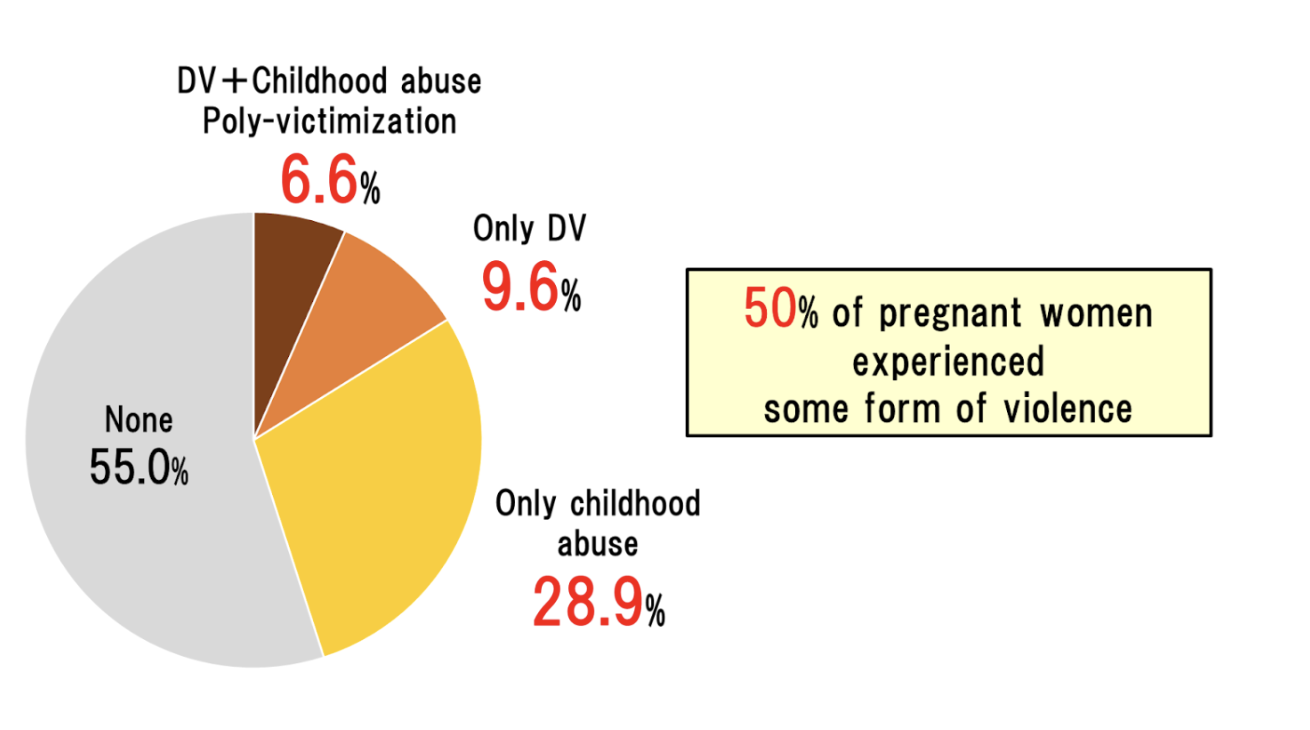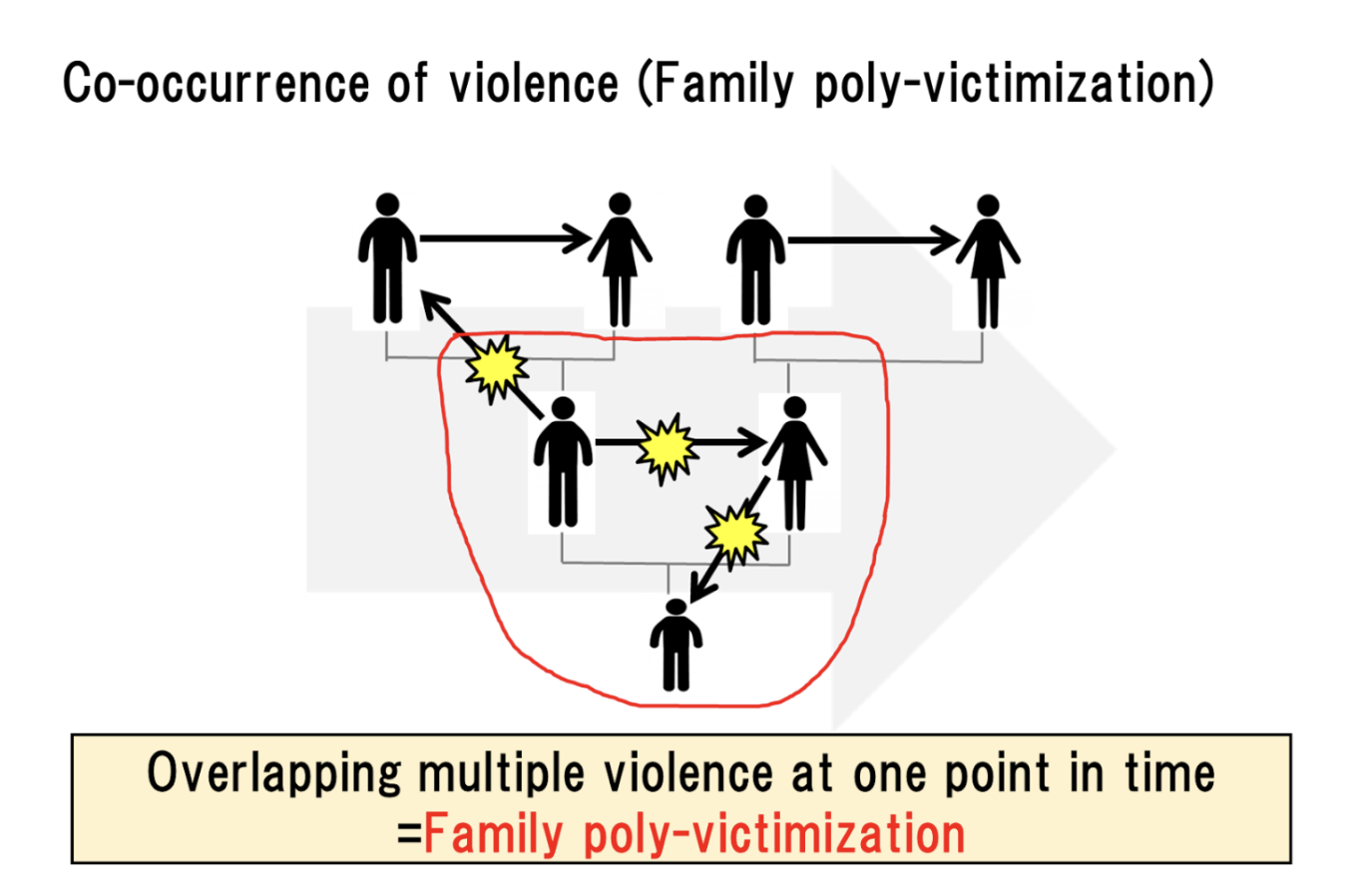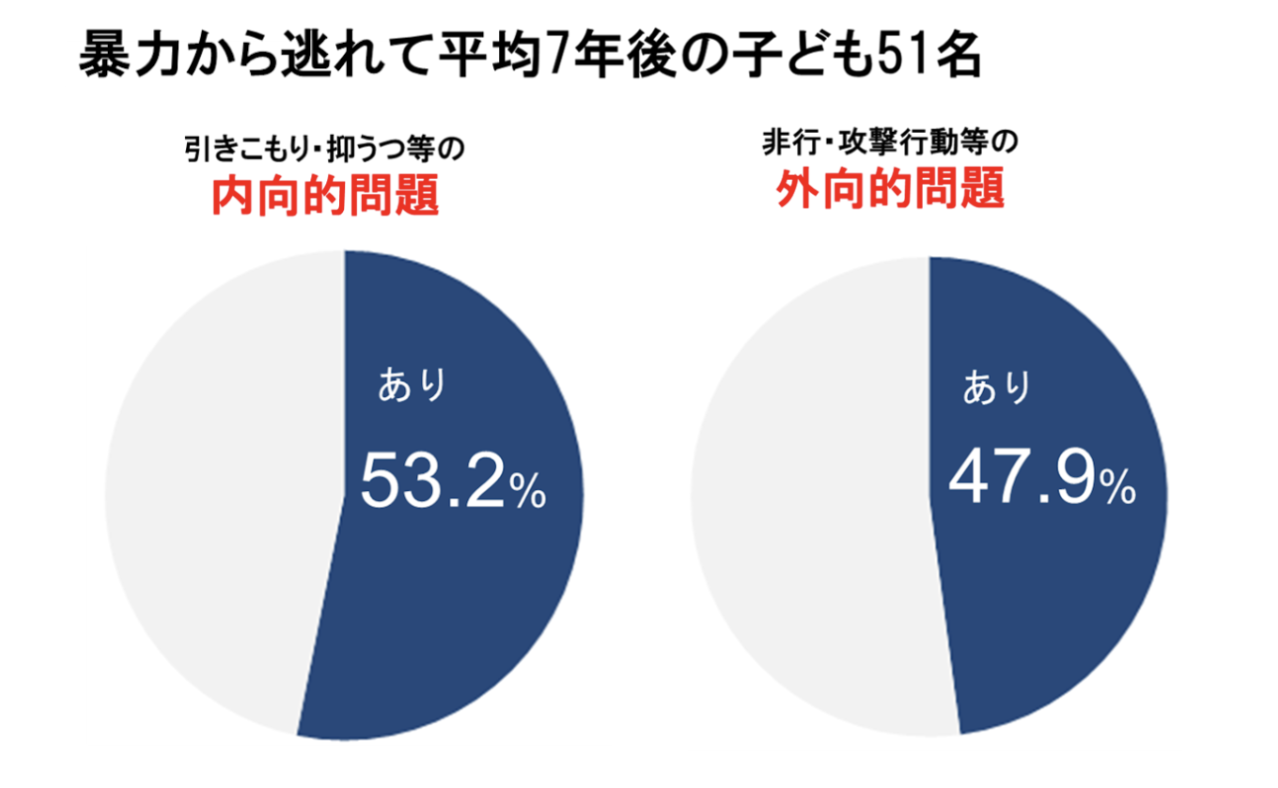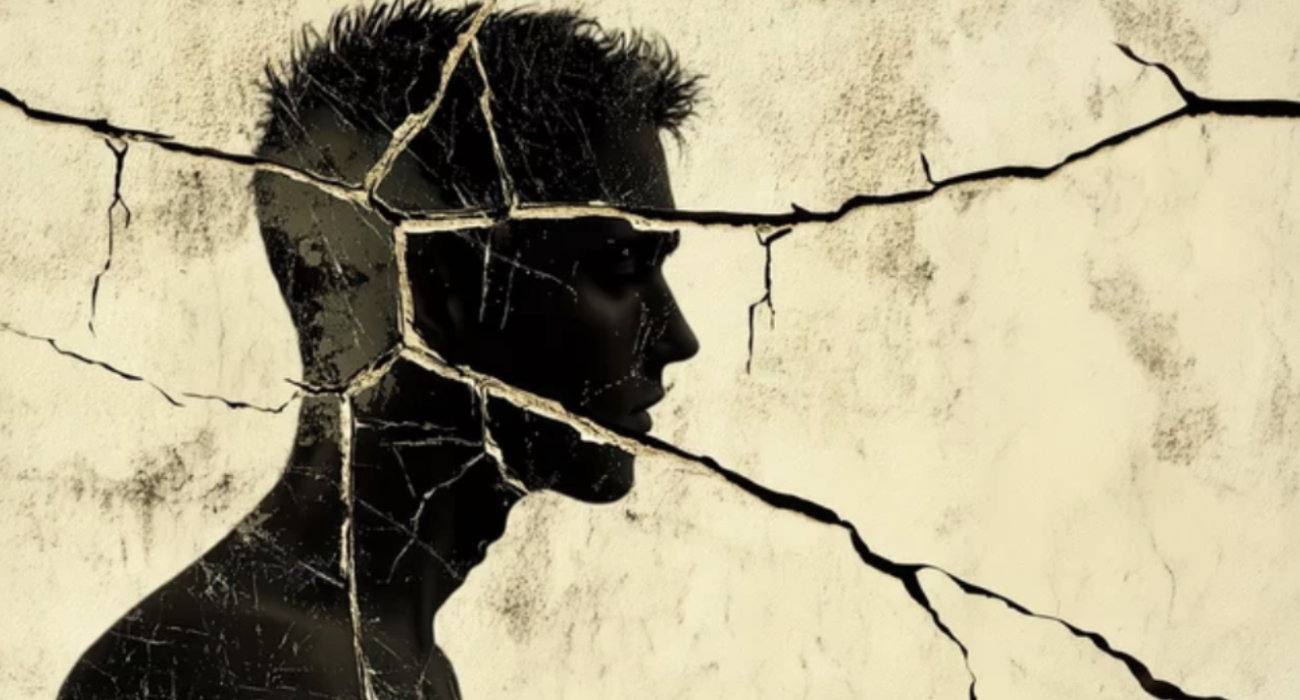Our Vision and Research Characteristics
Since 2016, the Multicultural Study of Trauma Recovery consortium (MiStory) —
a global collaborative research team consisting of 33 trauma researchers from 13 countries, including Japan, the United States, Greece, Turkey, Finland, and Iceland—has been investigating trauma recovery processes from diverse perspectives, including culture and gender.Denise Saint ArunaltThe consortium was founded by Dr. Denise Saint Arnault (University of Michigan), and its board includes Sachiko Kita the Representative Director of our Institute, Dr. Laura Sinko (Temple University), and Dr. Kleio Koutra (Hellenic Mediterranean University, Greece).
Our goal is to illuminate the diverse pathways of trauma recovery and develop and disseminate an internationally applicable care guidebook that supports trauma recovery in ways that are sensitive to cultural, gender, and individual differences.
To date, we have conducted narrative interviews with over 300 survivors of gender-based violence (GBV) across the world, using two innovative, creative methods—Clinical Ethnographic Narrative Interview (CENI; Saint Arnault, 2017) and Photo-experiencing and Reflective Listening (PEARL; 2021). These interviews encourage survivors to explore and express the meaning of their trauma and healing through drawings, diagrams, and photographs.
TIn addition, we have conducted surveys with over 2,000 survivors, and by employing mixed methods that integrate both qualitative interviews and quantitative survey data, we have gained a rich and complex understanding of survivors’ experiences and needs.
In Japan alone, we have interviewed more than 60 survivors and received survey responses from over 1,000 participants. We would like to take this opportunity to express our deepest gratitude to all those who have generously shared their experiences and supported our research.
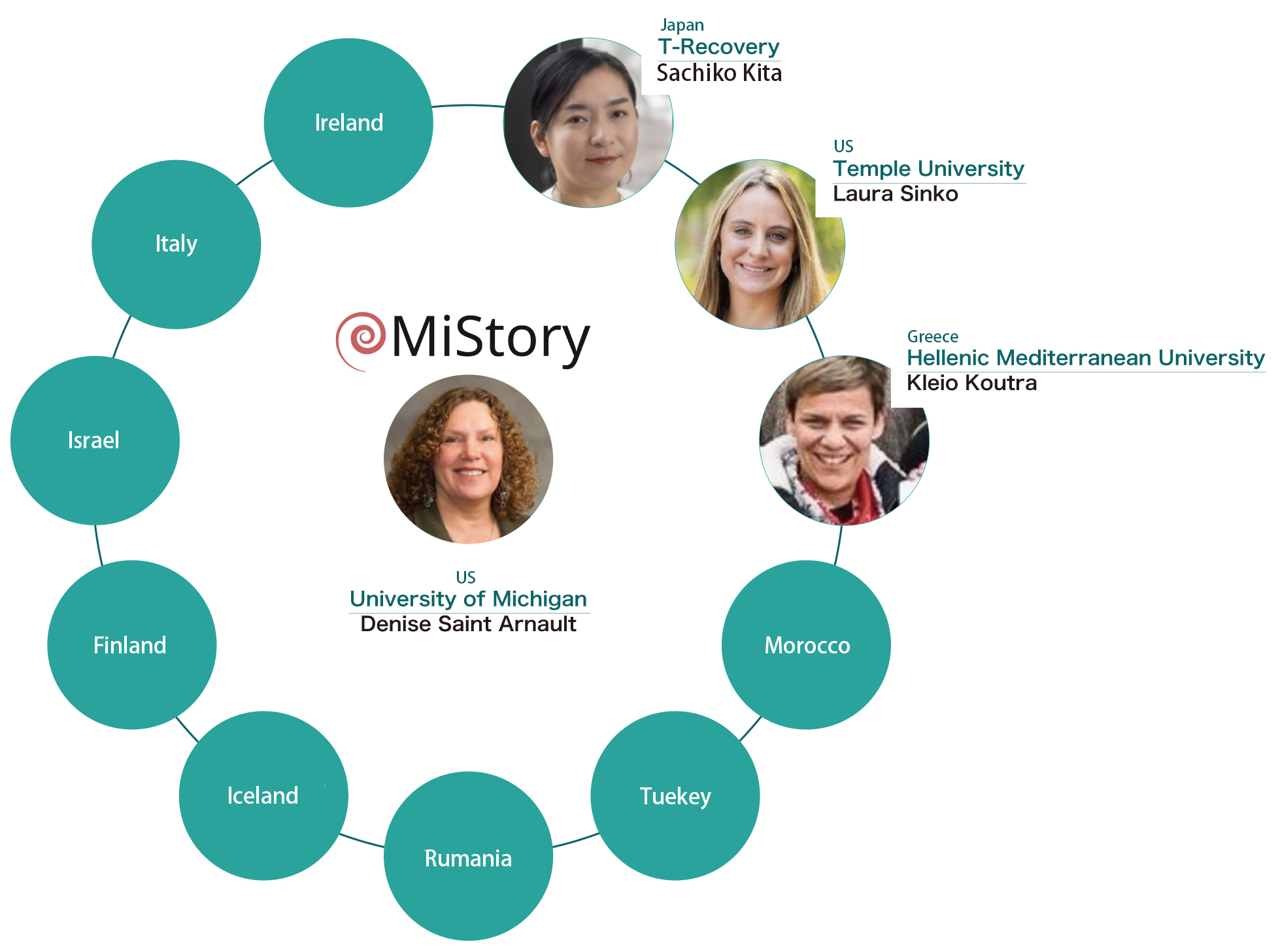
Vision Roadmap
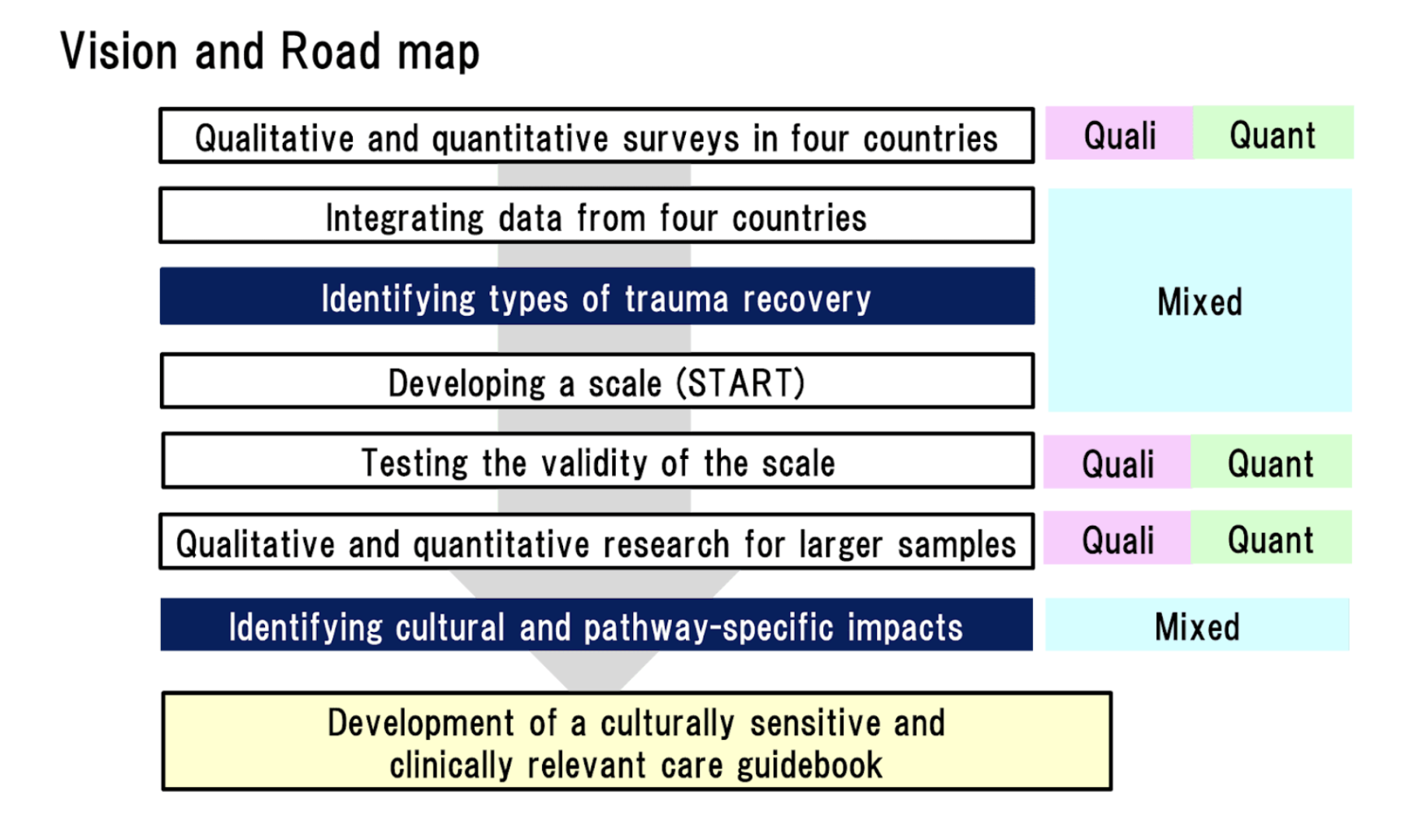
■Clinical Ethnographic Narrative Interview(CENI):
Social Network, Body Map, Lifeline, Card Sort
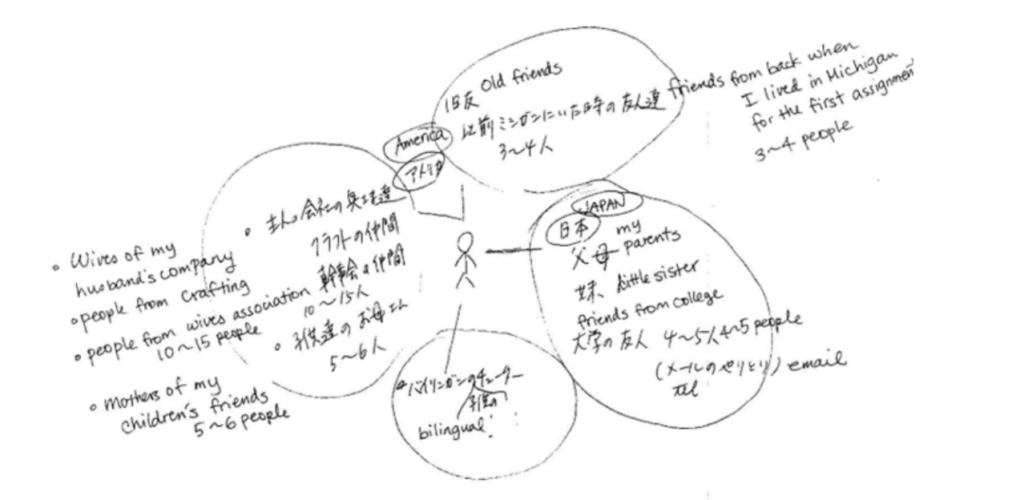
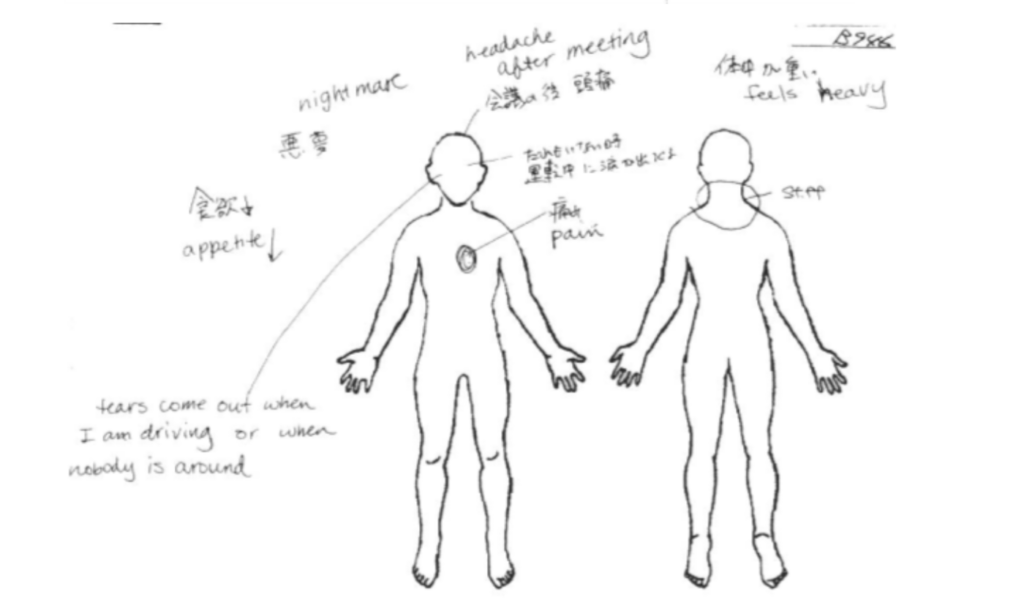
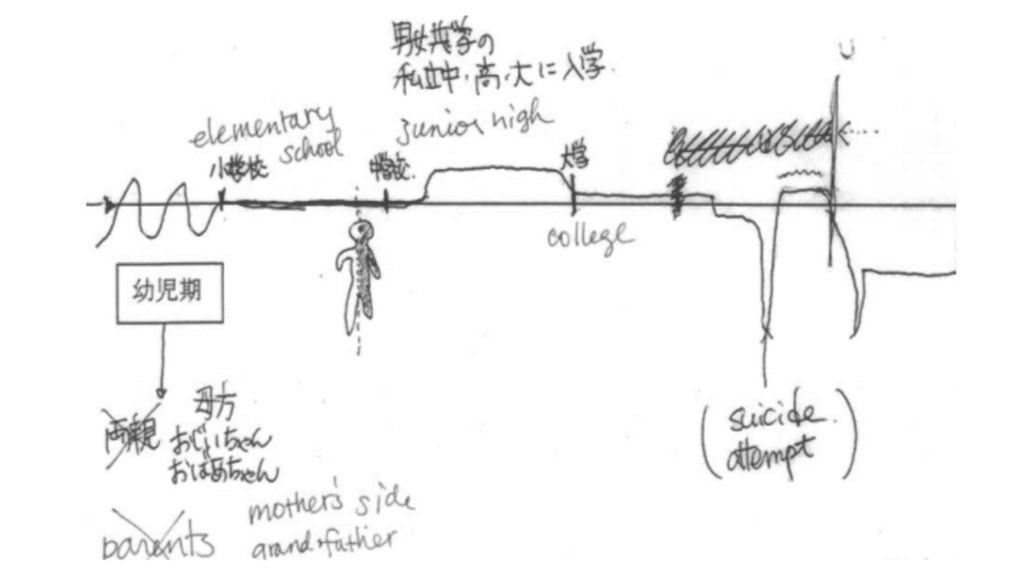
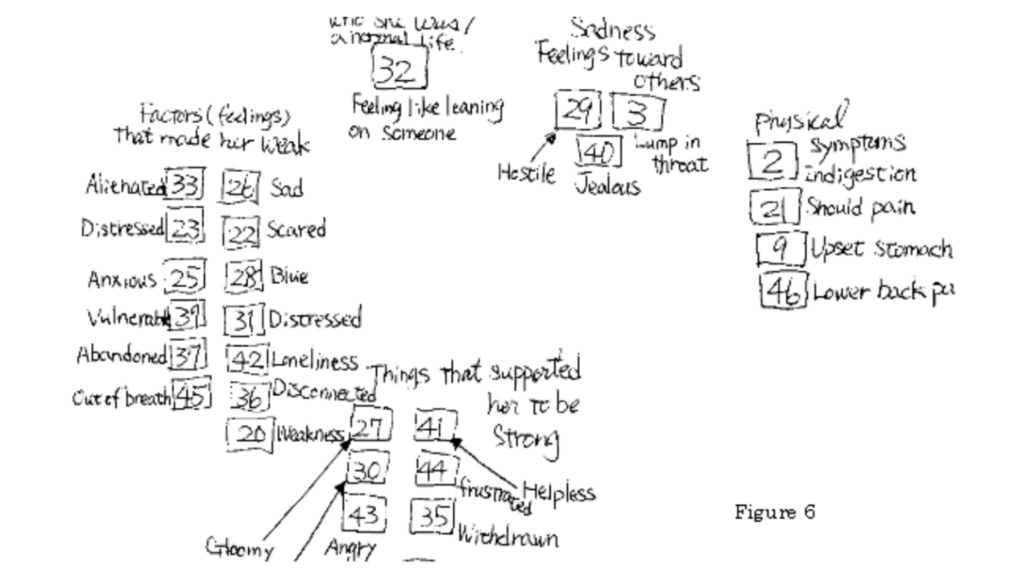
[Paper]
Saint Arnault. (2017). The Use of The Clinical Ethnographic Narrative Interview to Understand and Support Help Seeking After Gender-Based Violence. TPM. 24(3), 1-14.
■Photo-Experiencing and Reflective Listening (PEARL)
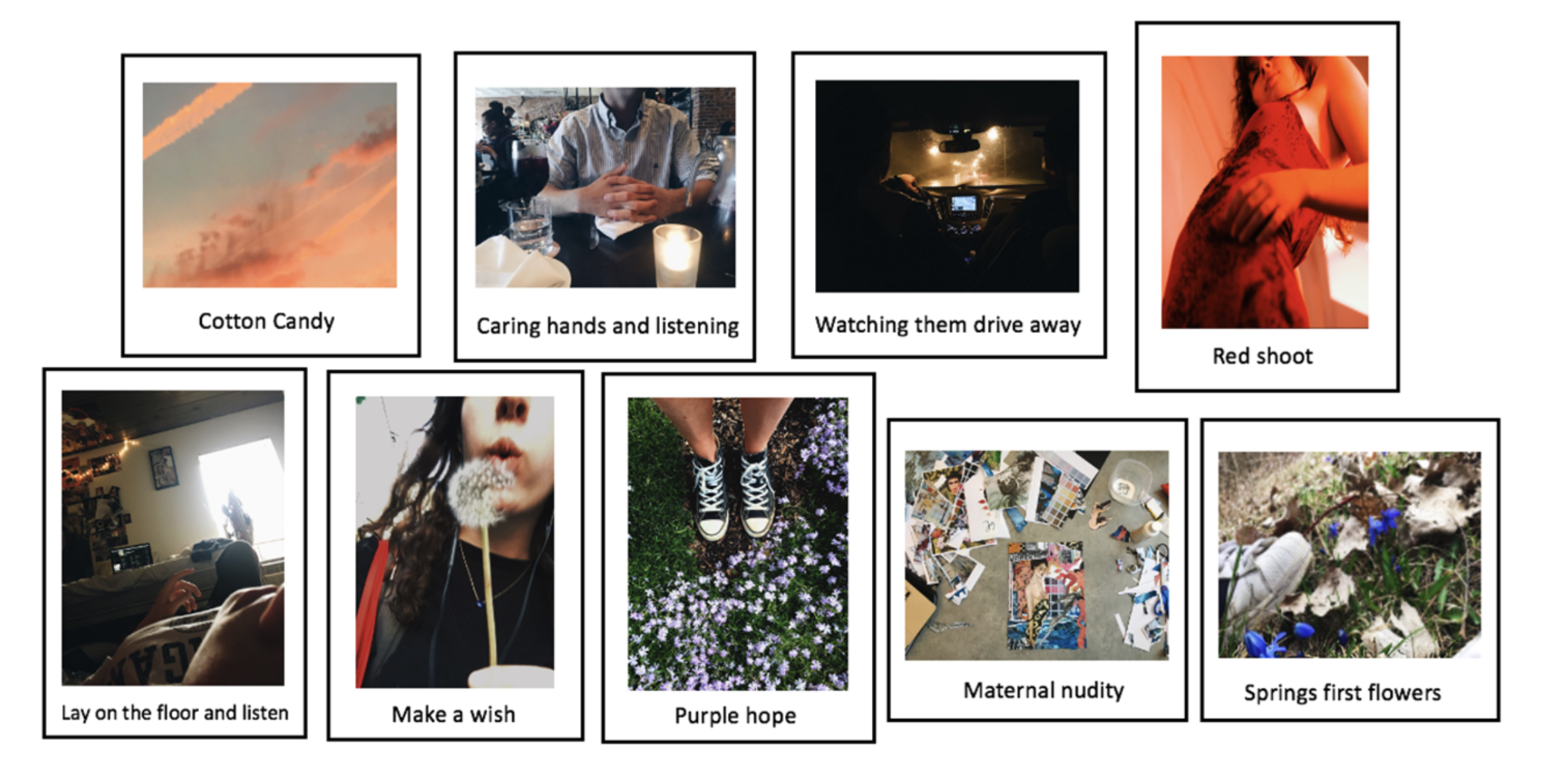
[Paper]
Sinko, L., & Saint Arnault, D. (2021). Photo-experiencing and Reflective Listening: A Trauma-informed Photo-elicitation Method to Explore Day-to-day Health Experiences. Public Health Nursing, 38(4), 661-670.
Trauma Recovery Typology and Scale Development
Between 2017 and 2021, based on interviews and survey data from 75 survivors of gender-based violence (GBV), including partner violence, child abuse, and sexual violence, in Japan, the United States, Greece, and Turkey, we identified six domains of trauma recovery and seven trauma recovery types. Using these elements, we developed the Trauma Recovery Rubrics (TRR), which define the characteristics of each trauma recovery type. These seven types represent current states of trauma recovery, which are considered to be flexible and subject to change based on environment and support. Additionally, there is no hierarchy among these seven types; rather, the aim is for researchers and providers to better understand the recovery process of each individual survivor.
Subsequently, we developed the Self-Assessment for Trauma Recovery Tool (START), which simplifies the identification of the six recovery types by combining normalization and minimization into a single type, the “Avoidant Type.” We have also developed a Japanese version of the tool and confirmed its validity of the classification.
Currently, we are conducting further validation using large-scale data from both Japan and the United States to clarify the characteristics, common and unique problems, and support needs of each trauma recovery type.
■Flow of Research
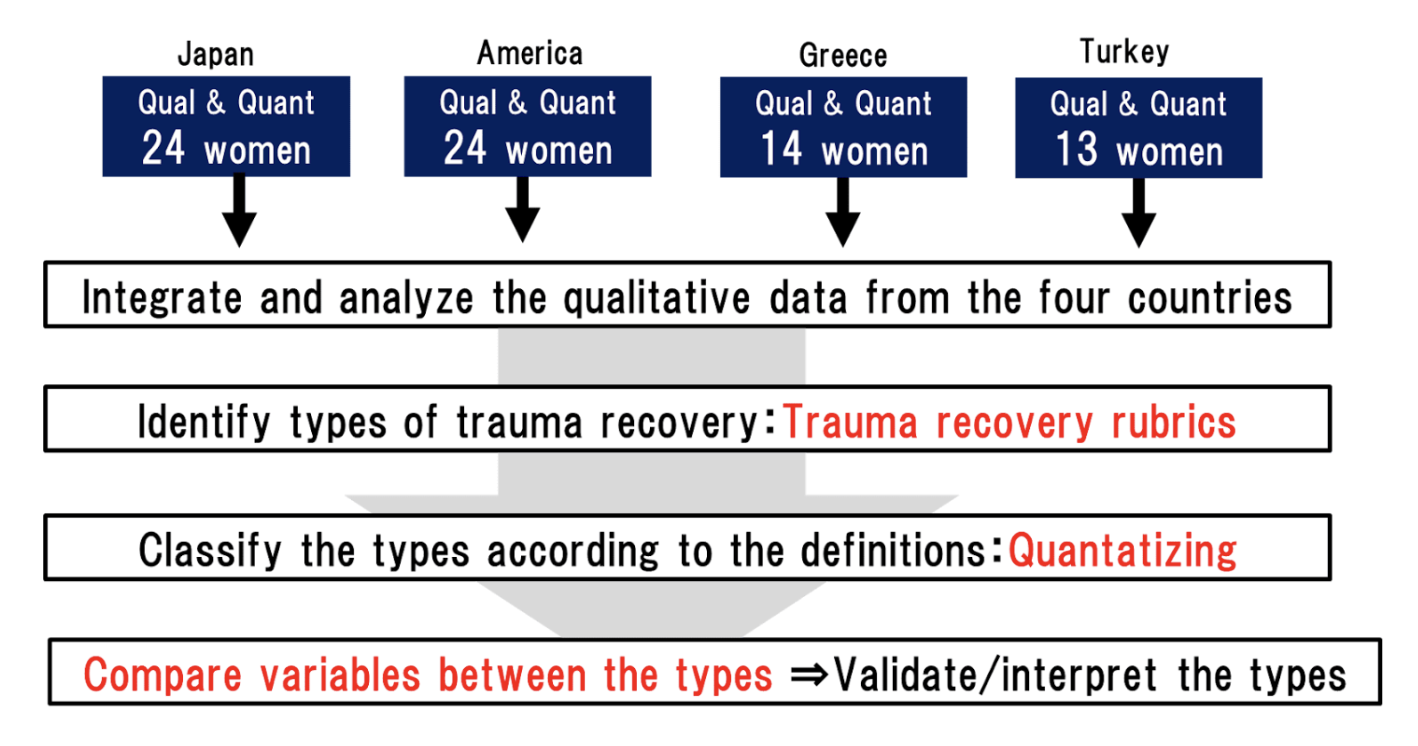
■Trauma Recovery Rubrics (TRR)
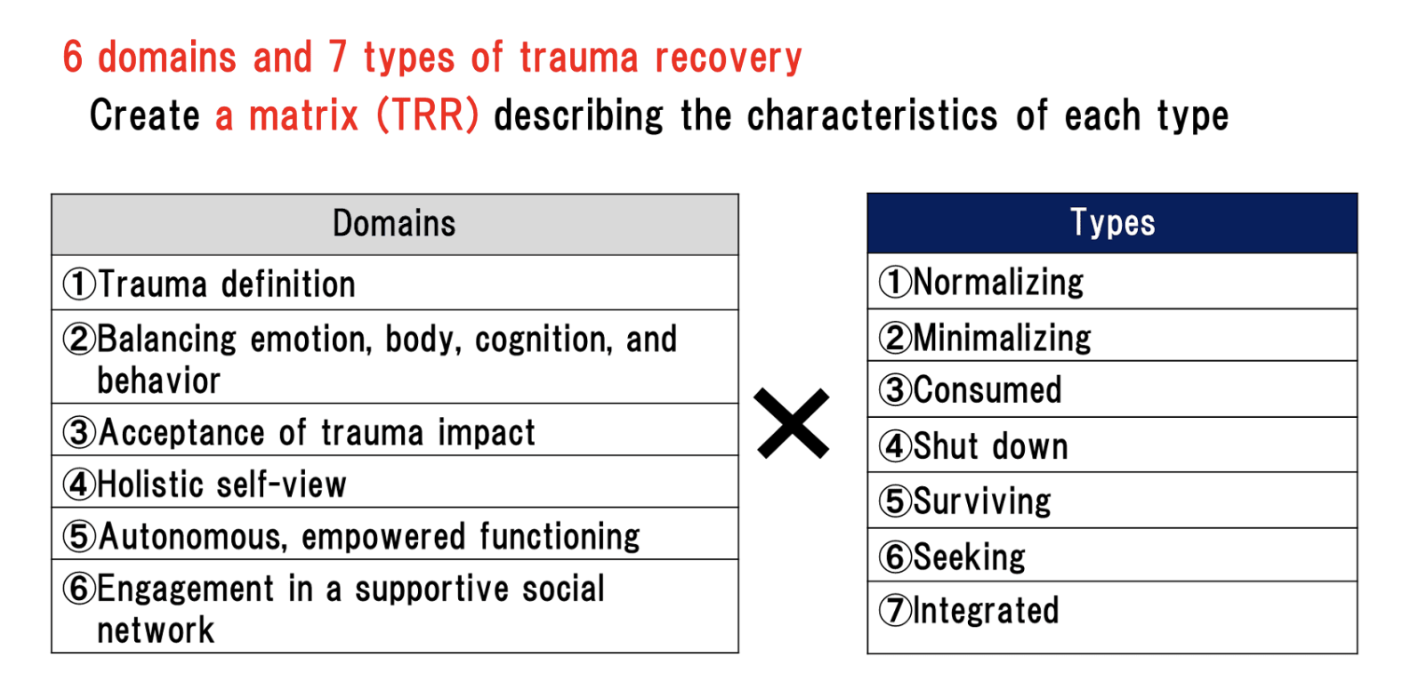
■7 Type Features
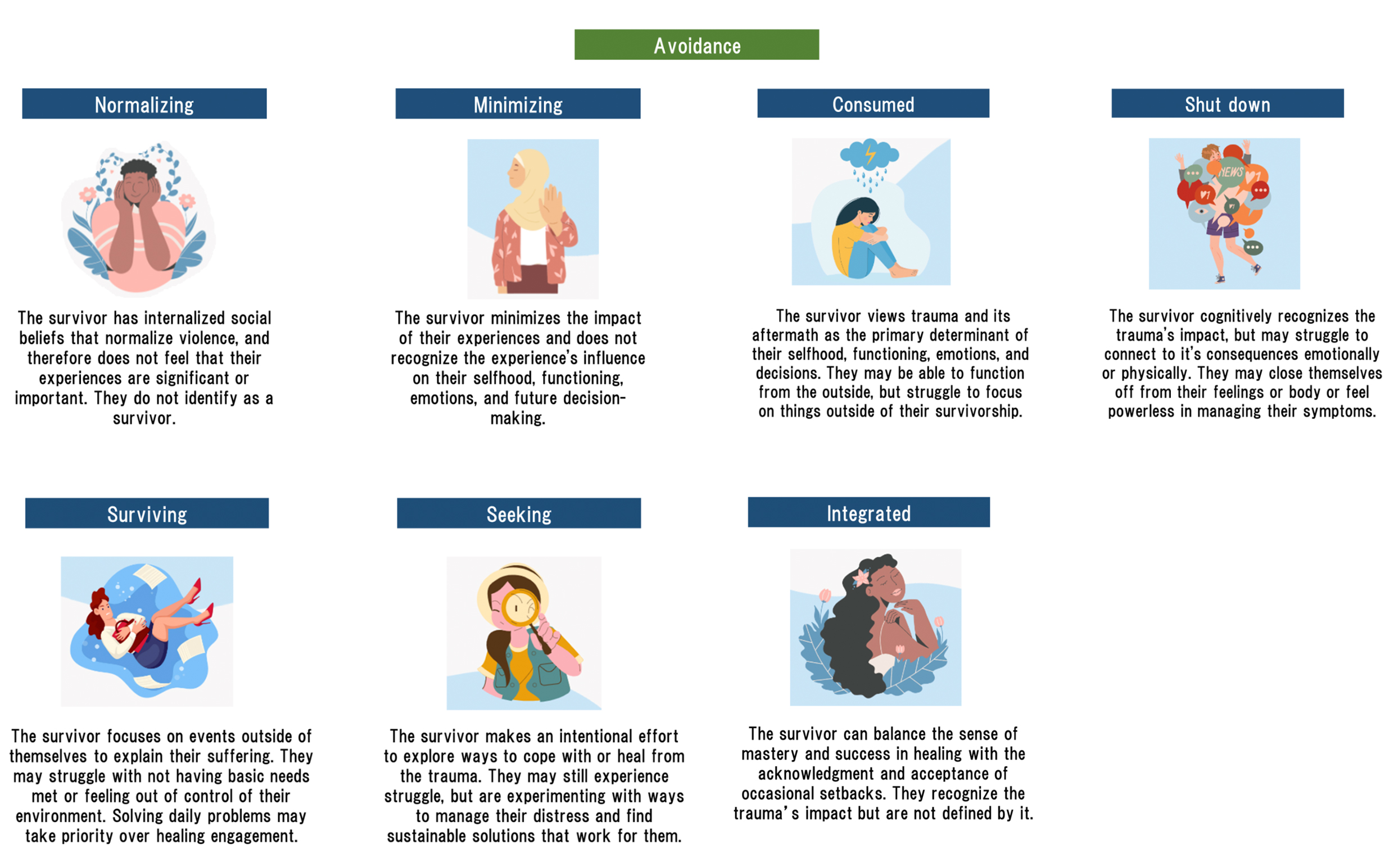
■Self-Assessment for Trauma Recovery Tool (START)
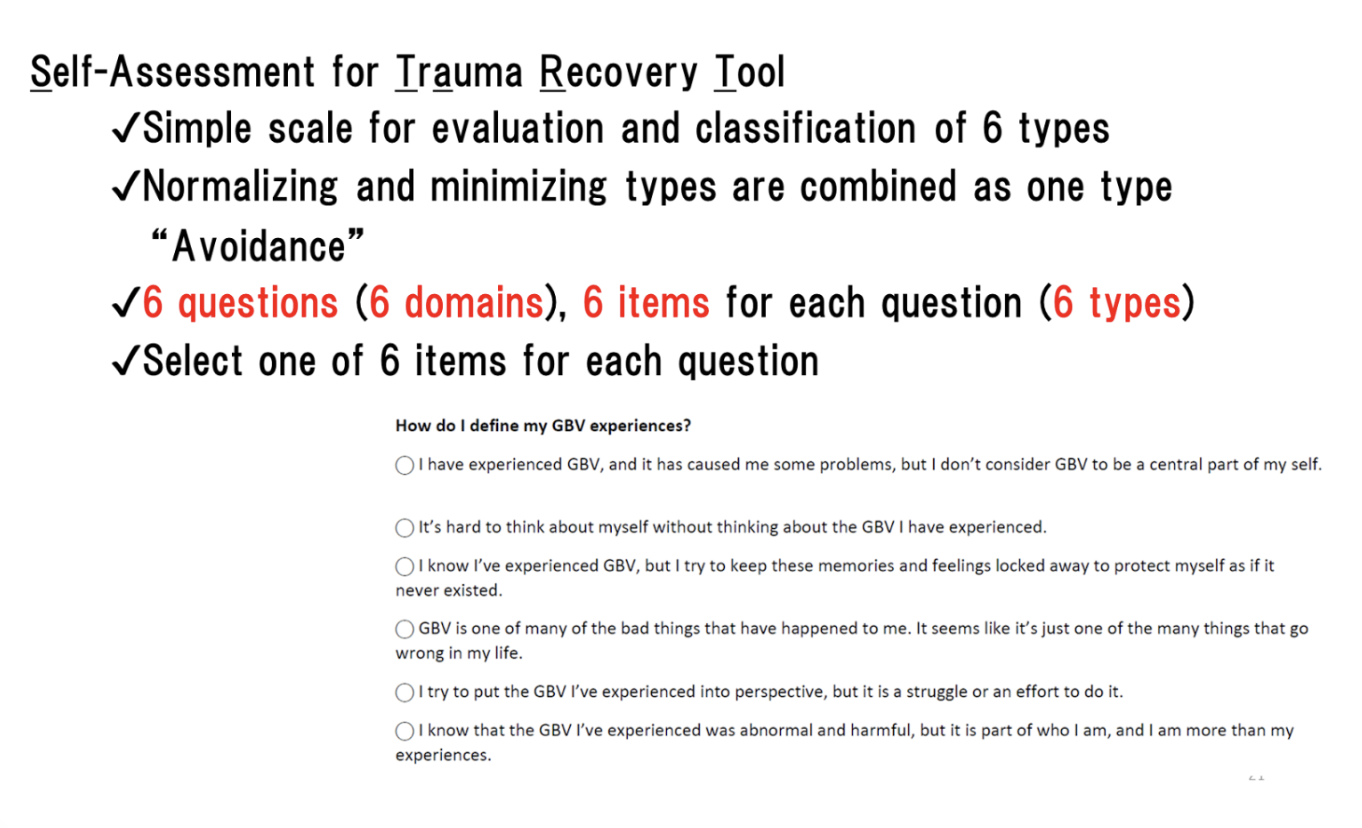
[Paper]
Koutra K, Burns C, Sinko L, Kita S, Bilgin H, Saint Arnault D. (2022). Trauma recovery rubric: A mixed-method analysis of trauma recovery stages in four countries. International Journal of Environmental Research and Public Health, 19, 10310.
Kita S, Sinko L, Koutra K, Saint Arnault D. (2024). Development of the Self-Assessment for Trauma Recovery Tool (START) for Survivors of Gender-based Violence: Classification using Latent Class Analysis. Psychology of Violence. https://doi.org/10.1037/vio0000508
Cultural Comparison of Trauma Recovery
Between 2017 and 2022, we integrated survey data from 449 survivors of gender-based violence (GBV) in six countries (Japan, the United States, Greece, Turkey, Iceland, and Finland) and compared the characteristics of trauma recovery processes between two cultural contexts: individualism (United States, Iceland, Finland) and collectivism (Japan, Greece, Turkey). The results showed that in individualist cultures, survivors tend to feel internal stigma (such as labeling themselves negatively, e.g., "I am a worthless person") when experiencing psychological distress, leading to conflicts with others. As a result, social support is lower, and trauma recovery is hindered. On the other hand, in collectivist cultures, survivors are more likely to express trauma through somatic symptoms (e.g., body pain, cold feet), which reduces conflicts with others (making it easier for others to accept) and increases social support, thereby promoting trauma recovery.
Additionally, between 2017 and 2021, we compared interview data from 138 survivors in seven countries (Japan, the United States, Turkey, Greece, Iceland, Finland, and Italy) regarding the advice they would give to other survivors with similar experiences. The results revealed that in Japan and Greece, advice often focused on accepting one's vulnerability, such as "It's okay to be yourself" and "You've done well." In contrast, in the United States and Iceland, advice more frequently emphasized encouraging strength and resilience, such as "Find your strength" and "Get back up."Also in 2017-2021.7 countries: Japan, USA, Turkey, Greece, Iceland, Finland, ItalyThe data from the interviews of 138 parties in the seven countries were compared with the "advice to parties who are going through the same experience" as told by the parties. Results,Japan, Greece, etc.includes vulnerabilities such as "Just be who you are" and "Good job!Advice on accepting "who you are"are many,USA, Iceland, etc.are "Find Your Strength" and "Stand Up".Back-breaking adviceWe found that many of the
These studies highlight the cultural differences in how distress, help-seeking behaviors, and trauma or pain are understood, underscoring the importance of culturally sensitive interventions.
■Indiidualism vs Collectivism
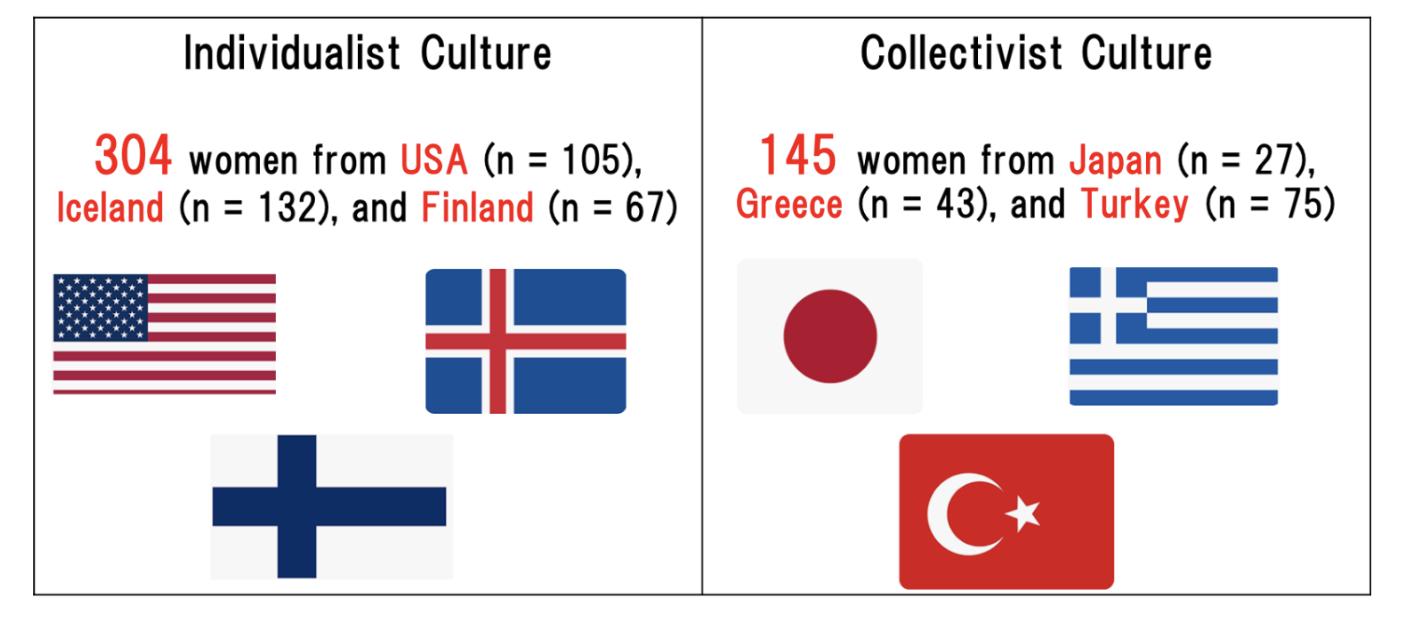
>Individualism
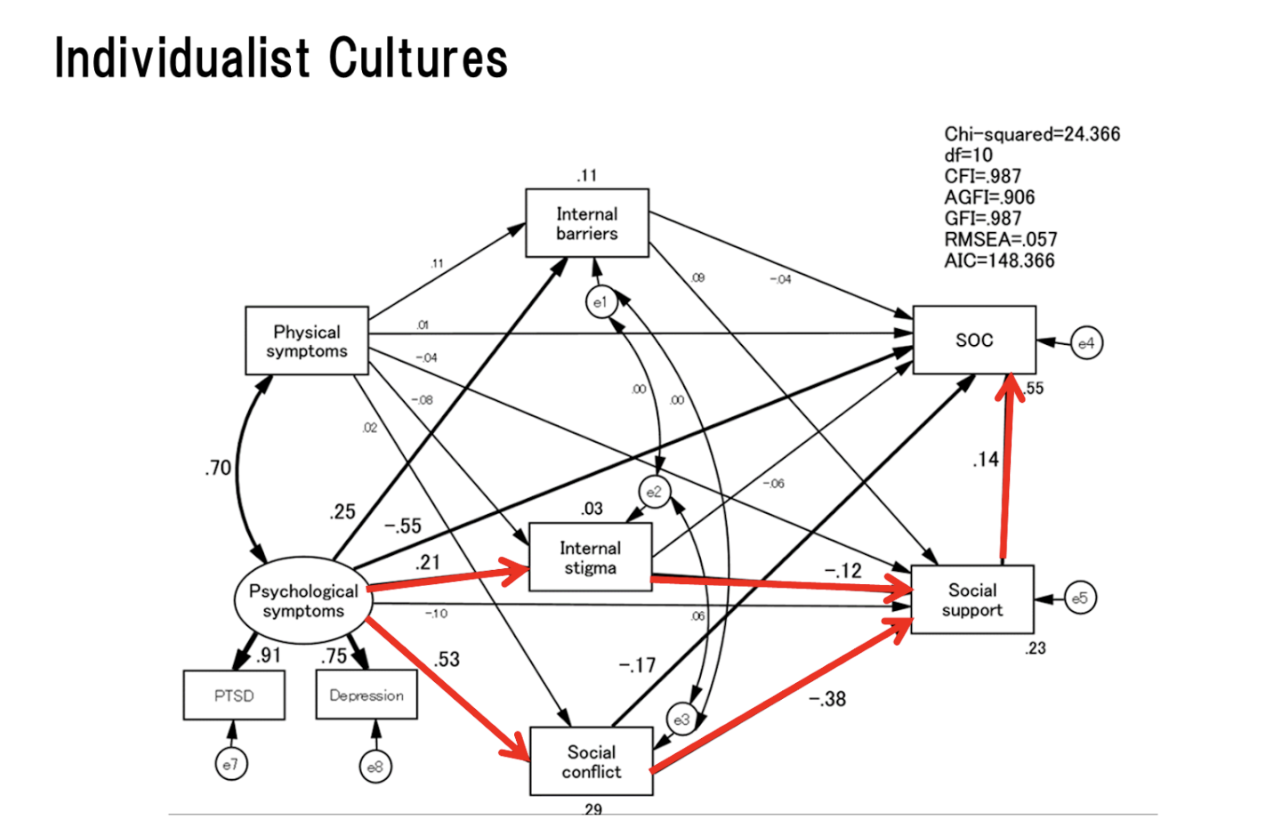
>collectivism
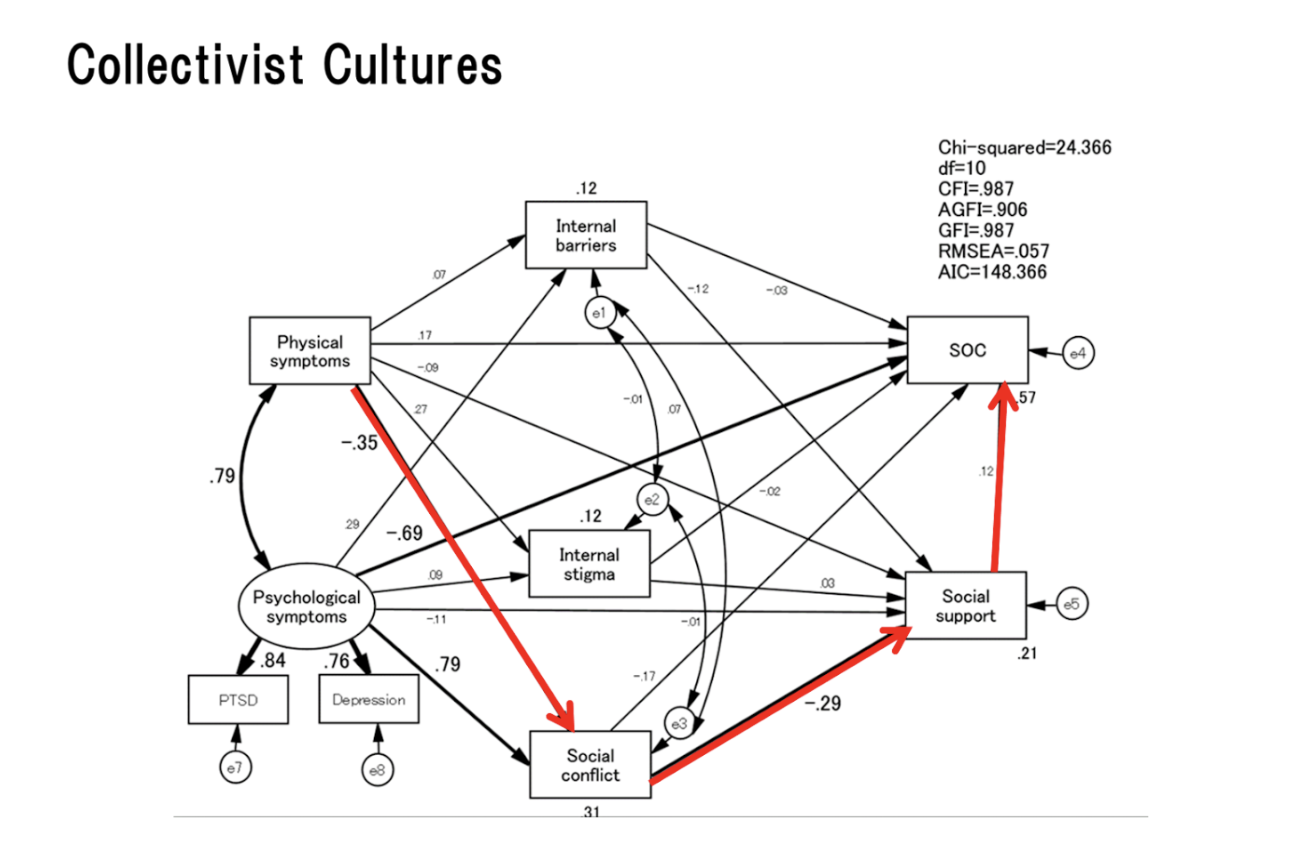
[Paper]
Kita S, Zong Z, Koutra, K, Sorsa, M, Bryngeirsdóttir HS, Thorvaldsdottir KB, Sinko L, Saint Arnault D. (2024). Cultural influences on trauma recovery after gender-based violence: Multiple-country structural equation modeling. Transcultural Psychiatry. (Accepted)
Sinko L, Sorsa M, Beardmore L, Thorvaldsdottir KB4, Bryngeirsdóttir HS, Kita S, Koutra K, Zonp Z, Rodelli M, Kylmä J, Ikeda M, Saint Arnault D. (2024). Global voices of trauma recovery: A synthesis of survivor-provided advice for overcoming gender-based violence across 7 countries. Qualitative Health Research. https://doi.org/10.1177/10497323241307001
Gender Comparison of Trauma Recovery
Our previous research suggests that the key elements of trauma recovery are common across genders. However, we believe that the context and process of trauma recovery may differ due to social roles, stereotypes, and gender biases. A large-scale survey conducted between 2022 and 2024 in Japan and the United States which collected data on gender (gender identity) and sexual orientation, included data from approximately 300 men, about 1,300 women, and 150 transgender/non-binary individuals. This data is being analyzed to explore the gender influence on the trauma recovery process.
Development of a Care Guidebook to Facilitate Trauma Recovery
Over the past nine years, we have explored the trauma recovery process and the issues and support needs of survivors from various perspectives, including trauma recovery types, culture, and gender. Integrating these findings, our team is currently developing an internationally applicable care guidebook that takes into account types, culture, and gender to promote trauma recovery for survivors with diverse backgrounds, which is available in both Japanese and English. Once the care guidebook is completed, we will provide more information through this Institute’s website.
